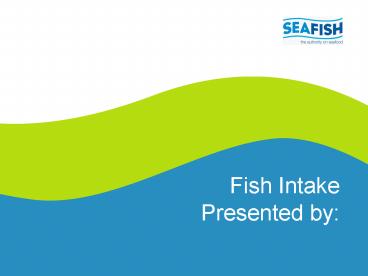Fish Intake Presented by: PowerPoint PPT Presentation
1 / 28
Title: Fish Intake Presented by:
1
Fish IntakePresented by
2
Course aim
- This course aims to provide learners with the
knowledge and skills required to support the
intake of fish into a fish processing operation.
3
Objectives
- On completion of the course you will be able to
- Understand the importance of Intake to fish
processing operations - Understand the quality standards that apply at
Intake - Assess the quality of fish and fish products
- Understand product traceability and control
4
About the day
- Session 1 The role and importance of Intake
- Session 2 Fish quality recognition
- Session 3 Intake processes
- Session 4 Control and traceability
5
Session 1
- The Role and Importance of Intake
6
Intake The Importance
- Why is Intake important to fish processing?
- Intake is essential to quality.
- Remember
- Poor quality in - Poor quality out!
7
Intake Critical control points
- What are the food safety hazards?
- Contamination
- Chemical
- Physical
- Biological
- Critical control points
- Inspection and testing
- Temperature control
- Supplier documentation
8
Intake processes vehicle inspection
- Vehicle inspection What should be checked?
- Vehicles must be
- Appropriate to the task
- Clean
- Of an appropriate temperature
- Free from taints
- Free from pest infestation
- Free from damage
9
Intake processes Product specifications
- Product specifications What is included?
- Will include requirements such as
- Temperature temperature ranges
- Size and/or weight
- Counts
- Storage conditions
- Appearance and characteristics
- Labelling and product information
10
Session 2
- Fish Quality Recognition
11
Fish spoilage
- What causes fish to spoil?
- Bacteria
- Enzymes
- Rancidity
12
Quality recognition fresh fish
- Assessing quality of fresh fish - What is
acceptable?
- Eyes should be bright and clear
- Skin should be bright with a good sheen
- No dents, discolouration or slime
- Gills should be bright blood red
- Flesh should be smooth, firm and springy to touch
- A fresh, pleasant sea weedy smell should be
present
13
Sensory quality assessment
- Quality assessment methods
- Torry Schemes
- EU (EAB) Scheme
- Quality Index Method (QIM)
Torry assessment
14
Quality recognition frozen products
- Assessing quality of frozen fish What is
acceptable? - Visual appearance
- Texture/firmness
- Drip loss
15
Quality recognition - shellfish
- Assessing quality of shellfish What is
acceptable?
16
Common causes of quality problems
- Causes of quality problems
- Poor hygiene
- Inadequate icing/temperature control
- Inappropriate storage facilities
- Inappropriate packing/packaging
- Poor handling
Freezer burn
Inappropriate storage
17
Session 3
- Intake Processes
18
Preparing fish intake areas
- How must intake areas be prepared?
- Preparations should consider
- Hygiene and cleaning
- Access to storage facilities
- Equipment and resources
19
Handling fish at intake
- What should be considered during the intake of
fish? - Handling should be
- Hygienic
- Careful
- Accurate
20
Inspection methods - temperature
- Temperatures can be checked using
- Temperature gauges
- Thermometers/temperature probes
- Observation (icing)
21
Inspection methods - sampling
- Samples must be
- Representative
- Securely stored
- Labelled accurately
- Recorded accurately
22
Intake processes check weighing
- Check weighing should
- Be implemented accurately
- Be recorded accurately
23
Inspection methods - organoliptic assessment
- Assessing fish flesh against recognised quality
standards - Appearance of raw flesh
- Appearance of cooked flesh
- Odour of cooked flesh
- Flavour of cooked meat
- Texture of cooked meat selected
24
Session 4
- Control and Traceability
25
Control intake procedures
- Documented procedures incorporating
- Work instructions
- Specifications
26
Control intake records
- Records completed at intake will record
- Supplier
- Delivery times
- Product and codes
- Delivery data (temperatures, product quality,
quantity) - Person completing inspection
- Codes allocated
27
Product control labelling and traceability
- Labelling facilitates
- Batch control
- Traceability
Product flow
28
Control
- Non-conforming product must be
- Controlled
- Segregated
- Labelled

